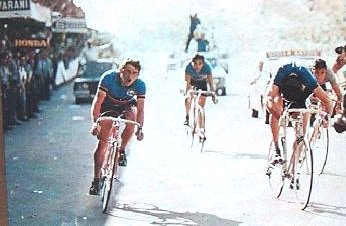The 1973 UCI Road World Championships in Barcelona is remembered as a significant event in cycling history, marked by the ongoing rivalry between Eddy Merckx and Felice Gimondi. Their competition came to a head during this race, resulting in one of the most notable contests of the time.
By 1973, Eddy Merckx, the dominant Belgian rider, was at the peak of his powers, having already won four Tour de France titles (1969, 1970, 1971, 1972), five Giro d’Italia victories, and several Classics. He was known as “The Cannibal” for his insatiable desire to win every race he entered, big or small.
Felice Gimondi, the Italian legend, was no stranger to success himself, with a Tour de France victory in 1965, three Giro d’Italia wins, and a victory in the 1968 Vuelta a España, making him one of the few riders to win all three Grand Tours. Although Gimondi was often overshadowed by Merckx’s dominance, he was always a formidable competitor and was considered one of the most complete riders of his generation.
The 1973 World Championships took place on a challenging course in Barcelona, featuring several steep climbs, which suited climbers and riders with endurance. With Merckx as the clear favorite, the race became a battle not just for the rainbow jersey but also for the personal rivalry between the two giants of the sport.
Merckx attacked several times throughout the race, thinning out the field and wearing down the other competitors. Gimondi, however, marked him closely, using his experience and tactical awareness to stay with the Belgian. The race came down to a reduced group of elite riders as they approached the final kilometers.
Gimondi’s strategy was simple but clear:
he needed to stay glued to Merckx throughout the race.
The Belgian, renowned for his relentless attacking style, launched a fierce move with 90 kilometers still to go. The field was immediately shattered, but only five riders had the strength and determination to follow, Gimondi among them. As the race intensified, a second wave of attacks came, further whittling down the lead group to just four: Gimondi, Merckx, Freddy Maertens, and Luis Ocaña. It was now an Italian and a Spaniard against two Belgians, setting the stage for a tactical battle of nations and wills.
As the kilometers wore down, Gimondi overheard Merckx and Maertens speaking in Flemish, and a suspicion crept into his mind. He wondered if the two Belgians had struck an agreement, one that would see Maertens sacrifice himself to aid Merckx in the final sprint. Gimondi understood that if this were the case, he would face not just Merckx, but a coordinated effort to outmaneuver him at the finish line.
When Maertens made a move late in the race, seemingly to attack or disrupt the group, Gimondi sensed it was a ploy.
His instinct told him that Maertens’ real purpose was to distract him, to throw him off Merckx’s wheel.
But Gimondi was no stranger to Merckx’s tactics. He had faced the Belgian in a head-to-head sprint two years prior, only to be defeated by the overpowering strength of The Cannibal. This time, however, Gimondi was determined to hold his nerve and focus solely on his rival.

The Italian, timing his effort perfectly, surged ahead and crossed the line first, capturing the coveted rainbow jersey of World Champion.
Yet, despite the glory, Gimondi later reflected with characteristic humility. He believed that had Maertens, the young Belgian prodigy, raced for himself that day rather than playing the role of Merckx’s ally, the outcome might have been very different. Gimondi admitted that Maertens had the legs to win that day, suggesting that if the young Belgian had sprinted for his own glory, he could have easily taken the World Championship.
Nonetheless, fate favored Gimondi on that day in Barcelona, allowing him to claim the victory that defined his rivalry with Merckx and solidified his place in cycling history.